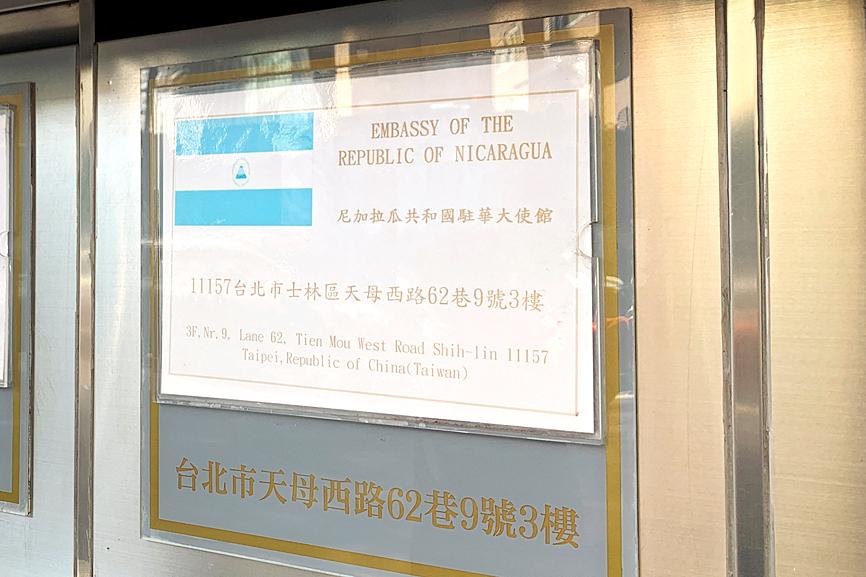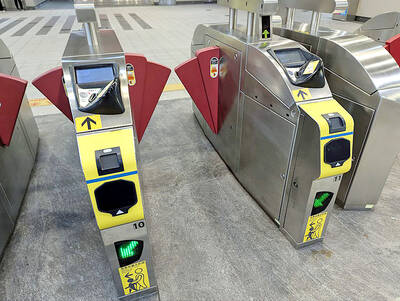No loans were pledged to Nicaragua in the run-up to the Central American nation’s election on Nov. 7, the Ministry of Foreign Affairs said yesterday following the cessation of bilateral ties.
The ministry made the comment after the London-based Financial Times cited reports that said Taipei had agreed to provide a new loan to Nicaragua ahead of the election, which saw Nicaraguan President Daniel Ortega re-elected amid accusations by the US of voting irregularities.
Taiwanese banks refused to extend a loan pledged by Taiwanese authorities for fear of contravening US sanctions on Nicaragua, which were extended in the aftermath of Ortega’s re-election, the Financial Times reported.

Photo: Sarah Wu, Reuters
Taiwan in February 2019 had agreed to provide a loan of US$100 million to its former ally, but the funds were to help Nicaragua rebuild its infrastructure in the wake of social unrest beginning in 2018 sparked by opposition to Ortega’s continued rule, the ministry said.
The bank it partnered with ultimately never provided the loan, due to “allocation issues,” it said without elaborating.
The loan was for “humanitarian assistance” and was not related in any way to last month’s disputed presidential election, the ministry said.
The US imposed a series of sanctions on Nicaraguan officials in 2018 due to what it described as human rights abuses and rampant corruption in the country under Ortega’s government.
Washington rolled out new sanctions on Nov. 15, denouncing Ortega’s re-election a week prior as a “sham” and saying that the Nicaraguan government was suppressing dissent and jailing opposition leaders.
In other news, the Ministry of Economic Affairs said that a free-trade agreement between Taiwan and Nicaragua remains in effect, despite the severing of formal diplomatic ties.
The pact was signed on June 16, 2006, and took effect on Jan. 1, 2008.
Either party can withdraw from the agreement with the exit taking effect 180 days after notification has been submitted, the economic ministry said.
Nicaragua has not provided such notification, so the pact remains in effect, it said.
Whether Managua would make a move on the deal is unclear, but Taiwan’s free-trade deal with El Salvador and Honduras is still in place, even though El Salvador broke diplomatic ties with Taiwan in 2018.
Even if Nicaragua were to end the agreement, it would have little effect on Taiwan’s foreign trade, the economic ministry said.
Taiwan’s exports to Nicaragua last year totaled US$22.94 million, or 0.01 percent of overall exports, while it imported US$143.56 million in goods from the Central American country, it said.
Taiwanese businesses that have invested in Nicaragua should also not be affected by the change in diplomatic status, given that they are registered as local businesses, it said.
Most Taiwanese businesses in Nicaragua are in the textile and tourism sectors, it said.

A strong continental cold air mass and abundant moisture bringing snow to mountains 3,000m and higher over the past few days are a reminder that more than 60 years ago Taiwan had an outdoor ski resort that gradually disappeared in part due to climate change. On Oct. 24, 2021, the National Development Council posted a series of photographs on Facebook recounting the days when Taiwan had a ski resort on Hehuanshan (合歡山) in Nantou County. More than 60 years ago, when developing a branch of the Central Cross-Island Highway, the government discovered that Hehuanshan, with an elevation of more than 3,100m,

Death row inmate Huang Lin-kai (黃麟凱), who was convicted for the double murder of his former girlfriend and her mother, is to be executed at the Taipei Detention Center tonight, the Ministry of Justice announced. Huang, who was a military conscript at the time, was convicted for the rape and murder of his ex-girlfriend, surnamed Wang (王), and the murder of her mother, after breaking into their home on Oct. 1, 2013. Prosecutors cited anger over the breakup and a dispute about money as the motives behind the double homicide. This is the first time that Minister of Justice Cheng Ming-chien (鄭銘謙) has

TRANSPORT CONVENIENCE: The new ticket gates would accept a variety of mobile payment methods, and buses would be installed with QR code readers for ease of use New ticketing gates for the Taipei metro system are expected to begin service in October, allowing users to swipe with cellphones and select credit cards partnered with Taipei Rapid Transit Corp (TRTC), the company said on Tuesday. TRTC said its gates in use are experiencing difficulty due to their age, as they were first installed in 2007. Maintenance is increasingly expensive and challenging as the manufacturing of components is halted or becoming harder to find, the company said. Currently, the gates only accept EasyCard, iPass and electronic icash tickets, or one-time-use tickets purchased at kiosks, the company said. Since 2023, the company said it

Ferry operators are planning to provide a total of 1,429 journeys between Taiwan proper and its offshore islands to meet increased travel demand during the upcoming Lunar New Year holiday, the Maritime and Port Bureau said yesterday. The available number of ferry journeys on eight routes from Saturday next week to Feb. 2 is expected to meet a maximum transport capacity of 289,414 passengers, the bureau said in a news release. Meanwhile, a total of 396 journeys on the "small three links," which are direct ferries connecting Taiwan's Kinmen and Lienchiang counties with China's Fujian Province, are also being planned to accommodate